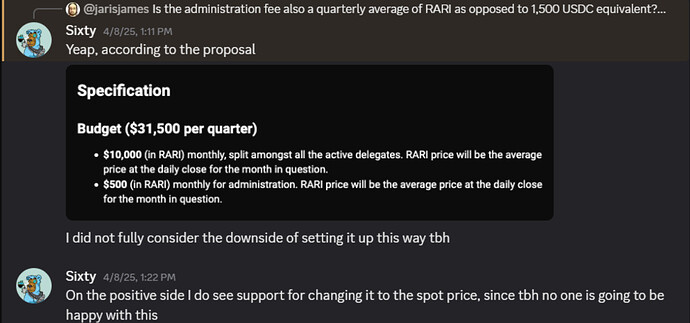Read the room, @bitblondy
Multiple delegates have already expressed support for removing quarterly quorum requirements, because it’s unnecessary friction. @coffee-crusher even asked that we keep the discussion respectful, yet both you and @Sixty continue addressing me with sarcasm and talking down to me in a condescending way.
Saying “you know how accepting a job works” is deeply unprofessional. It shows you can’t separate feedback on governance systems from personal ego. That’s not how responsible system designers operate. That’s how central planners operate.
Let’s clarify: I’m the founder of daospace, the product this program was built on. Sixty oversold his background, and only got involved because he pitched himself as a Product Manager after helping me get a grant last year. He was never a developer, and frankly, not essential. I gave him a shot. He burned that trust, and is no longer a member of the daospace team, which currently consists of me, and two designers.
The truth is, the payout structure was created by the authors listed on RRC-40, not by “daospace” or me. And it failed. Not the people. Not the idea. The system. No other initiative in the DAO requires a full vote just to release funds already earned. This was a design flaw that undermined the entire program.
And it’s not just my view that the program had flaws:
- Sixty himself admitted this program had flaws during a discussion about the program.
→ “I did not fully consider the downside of setting it up this way.”
→ “I do see support for changing it to the spot price, since tbh no one is going to be happy with this.”
→ “There is nothing I want more than all the other delegates to weigh in… because using the forum will take forever.”
That’s not how governance works. You don’t fast-track decisions to avoid transparent community input.
This proposal replaces RRC-40 entirely. So the admin fee set by @Cr1st0f is irrelevant now. Sixty shared screenshots where Cr1st0f stated clearly: if daospace doesn’t accept $500/month, he won’t be associated, or support the program. It was a take-it-or-leave-it offer. I went along with it then, for the DAO’s sake. But I’m not doing that again.
This is why I’m proposing a cleaner, scalable, and fairer version. Because the DAO deserves better than a spreadsheet hidden in backchannels. It deserves transparency, autonomy, and a system designed with actual contributors in mind; not gatekept by a trio who takes every critique personally.


